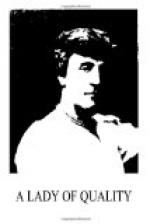“Wouldst have thought I was too old to change,” answered she, “but I was not. Did I not tell thee I would be a great lady. There is naught a man or woman cannot learn who hath the wit.”
“Thou hadst it, Clo,” said Sir Jeoffry, gazing at her with a sort of slow wonder. “Thou hadst it. If thou hadst not—!” He paused, and shook his head, and there was a rough emotion in his coarse face. “I was not the man to have made aught but a baggage of thee, Clo. I taught thee naught decent, and thou never heard or saw aught to teach thee. Damn me!” almost with moisture in his eyes, “if I know what kept thee from going to ruin before thou wert fifteen.”
She sat and watched him steadily.
“Nor I,” quoth she, in answer. “Nor I—but here thou seest me, Dad—an earl’s lady, sitting before thee.”
“’Twas thy wit,” said he, still moved, and fairly maudlin. “’Twas thy wit and thy devil’s will!”
“Ay,” she answered, “’twas they—my wit and my devil’s will!”
She rode to the hunt with him as she had been wont to do, but she wore the latest fashion in hunting habit and coat; and though ’twould not have been possible for her to sit her horse better than of old, or to take hedges and ditches with greater daring and spirit, yet in some way every man who rode with her felt that ’twas a great lady who led the field. The horse she rode was a fierce, beauteous devil of a beast which Sir Jeoffry himself would scarce have mounted even in his younger days; but she carried her loaded whip, and she sat upon the brute as if she scarcely felt its temper, and held it with a wrist of steel.
My Lord Dunstanwolde did not hunt this season. He had never been greatly fond of the sport, and at this time was a little ailing, but he would not let his lady give up her pleasure because he could not join it.
“Nay,” he said, “’tis not for the queen of the hunting-field to stay at home to nurse an old man’s aches. My pride would not let it be so. Your father will attend you. Go—and lead them all, my dear.”
In the field appeared Sir John Oxon, who for a brief visit was at Eldershawe. He rode close to my lady, though she had naught to say to him after her first greetings of civility. He looked not as fresh and glowing with youth as had been his wont only a year ago. His reckless wildness of life and his town debaucheries had at last touched his bloom, perhaps. He had a haggard look at moments when his countenance was not lighted by excitement. ’Twas whispered that he was deep enough in debt to be greatly straitened, and that his marriage having come to naught his creditors were besetting him without mercy. This and more than this, no one knew so well as my Lady Dunstanwolde; but of a certainty she had little pity for his evil case, if one might judge by her face, when in the course of the running he took a hedge behind her, and pressing his horse, came up by her side and spoke.




